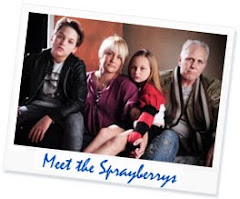Dana and I watch our little actors closely, additionally we watch other child actors, and actually, we watch and pay attention to kids in general, especially the kids in our immediate lives.
What we are looking at is behavioral traits; We may choose to not allow our kids to associate with kids who are disrespectful. Additionally we speak straight and with great clarity when our kids fail to meet our expectations. If behavior is good - hugs and pats on the back. If behavior needs improvement, we redirect.
Our number one objective is to raise kind, considerate and respectful children. We attempt to bring Dylan & Ellery up as confident and well-rounded leaders. Whether they choose to remain within the entertainment industry is their call, but how they treat others and communicate is our responsibility to teach.
Just the other day we were connecting the dots from our parental behavior to their behavior and in doing so found ourselves evaluating and asking ourselves what kind of parent leaders are we? If our behavior directly affects theirs, then are we behaving as "stage parents" or "child actor parents" (as previously discussed)?
My first thought on what defined the difference between parenting as a "stage parent" rather than a "child actor parent" was based on discrete versus indiscreet parental behavior, on the set and otherwise. I believe that discrete parenting is reflected in children who may lean more toward a workable & genuine style on set. On the other hand, indiscreet & "rougher" parenting seems to find the kids leaning on the side of acting out more.
I am making this concept simple for a reason: While we all know there is much more to parenting than meets the eye, when we see how our children act, we must accept that our children’s behavior is a result of their environment. We obviously realize that everyone has a bad day or moment, that’s a given, but I am referring to consistent behavior traits.
If the parent is over-the-top, overly verbal, over dramatic, etc the child learns to behave in a similar manner. Where as a calm and collected parent tends to yield similar (not always perfect, but similar) behavior in offspring.
We reminded ourselves of how important it is that we remain discrete and focused on the film set objectives, additionally how we can successfully guide our little actors discretely rather than drawing attention to ourselves and issues that need to be addressed within the family, not within the company of the work environment.
The bottom line is that when children are on set and they know their boundaries and are prepared, the production process goes forward smoothly. Time is money and in this business; No one in production wants to work with a challenging individual, child or adult, and we have a choice.
At home and on set we can have a positive impact. And guess what. We, the parents, also have an opportunity to be appreciated as a solid member of the production team, not as an outsider - A simple reward for a job well done.
This is Our Story
We're the Sprayberrys and we moved to Los Angeles about four years ago to have our go at Hollywood. When we met the folks at Children In Film, they thought it would be a great idea if we documented our story. After all, our failures and successes (hopefully more the latter than the former) can be your lesson book.
So here you have it - Dylan and Ellery working through the ups and downs of being child actors - their mother and I working hard every day to ensure their success not only as actors, but also as well-adjusted members of society.
So here you have it - Dylan and Ellery working through the ups and downs of being child actors - their mother and I working hard every day to ensure their success not only as actors, but also as well-adjusted members of society.
Monday, June 30, 2008
Sunday, June 29, 2008
"Stage Moms" become "Child Actor Parents"
~CS
Subscribe to:
Posts (Atom)

.jpg)

